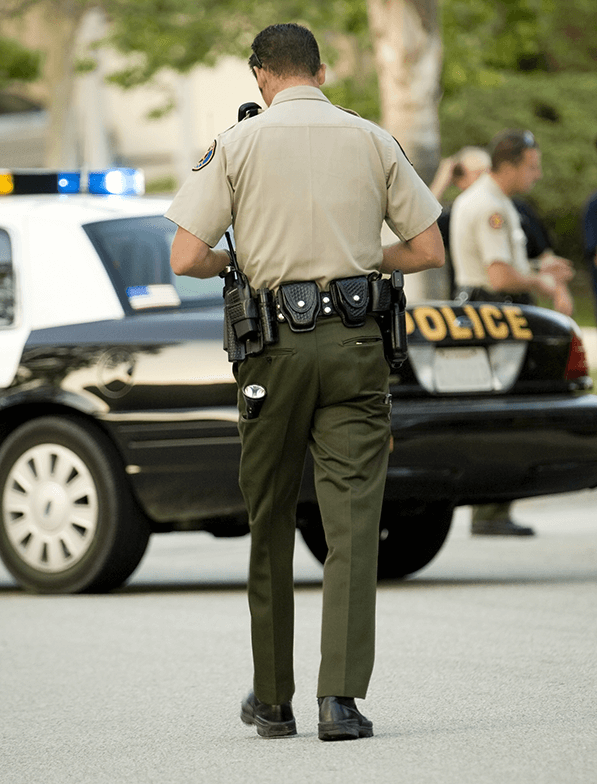Police officers are amazing human beings. Why so amazing? First, law enforcement is one of the most admired and respected professions. A 2016 Gallup survey found law enforcement to be the 6th most trusted occupation in the United States, and a Harris Poll ranked the field as the 7th most prestigious profession. Second, the roughly one million U.S. law enforcement officers working in the United States are integral to the very fabric of our Country. Police officers take the motto “to protect and serve” seriously, and this is a tremendous responsibility. Without our police officers, society would devolve into what Thomas Hobbes described in his 1651 Leviathan as a state of “continual fear and danger of violent death, and the life of man, solitary, poor, nasty, brutish, and short.” Ours would be a land of chaos and violence. Whether we’re a business owner, a homeowner, a parent or a single, when we’re in danger from the bad guys, we call the good guys. We call the police.
 But police officers are amazing for another reason. Unbeknownst to most of us, they not only sacrifice their safety for our own, but they can also carry personal and often unspoken burdens. According to Careercast.com, police officers serve in one of the most stressful professions in the United States. One reason for this could be that despite their commitment to our safety, police officers aren’t exactly feeling the love from us. Business Insider found that law enforcement officers scored below average in terms of societal warmth. Other stressors also result from irregular shift work, isolation, sleeplessness, and nutritional gaps. These daily realities add to the more severe pressures of sudden “fight or flight” situations, adrenaline rushes and emotional drops, witnessing human suffering, and meeting the superhuman expectations of superiors, coworkers, the general public, and even themselves. It is not uncommon for such pressures to lead to secondary consequences including alcohol or substance abuse, DUI, relational difficulties at home, stress-related physical ailments, professional burnout and quitting, moral injury, depression, post-traumatic stress disorder (PTSD), and even suicide. A common refrain is to adopt a “suck it up, it’s part of the job” mentality in order to cope. Most feel guilty if they acknowledge any sort of personal struggle out of fear these will reflect weakness or inability to meet expectations, including their own.
But police officers are amazing for another reason. Unbeknownst to most of us, they not only sacrifice their safety for our own, but they can also carry personal and often unspoken burdens. According to Careercast.com, police officers serve in one of the most stressful professions in the United States. One reason for this could be that despite their commitment to our safety, police officers aren’t exactly feeling the love from us. Business Insider found that law enforcement officers scored below average in terms of societal warmth. Other stressors also result from irregular shift work, isolation, sleeplessness, and nutritional gaps. These daily realities add to the more severe pressures of sudden “fight or flight” situations, adrenaline rushes and emotional drops, witnessing human suffering, and meeting the superhuman expectations of superiors, coworkers, the general public, and even themselves. It is not uncommon for such pressures to lead to secondary consequences including alcohol or substance abuse, DUI, relational difficulties at home, stress-related physical ailments, professional burnout and quitting, moral injury, depression, post-traumatic stress disorder (PTSD), and even suicide. A common refrain is to adopt a “suck it up, it’s part of the job” mentality in order to cope. Most feel guilty if they acknowledge any sort of personal struggle out of fear these will reflect weakness or inability to meet expectations, including their own.
However, the personal struggles of police officers nationwide are real, and the trends in some areas are bad or worsening. For example, law enforcement officers rank higher than the national average in alcohol abuse, divorce, PTSD, and suicide. These are very real secondary consequences of stress or trauma related to their work. When the trends are headed in the wrong direction, it means society’s efforts—through governmental programs or otherwise—are simply incomplete or ineffective. The problems of police officers described above are not simply mental, but also physical, emotional, psychological, and spiritual. Likewise, our thinking about helping them and their families needs to be equally comprehensive while acknowledging the magnitude of the societal problem.
This is where Forward Free comes in. Our vision is to be the Nation’s leader in transforming people impacted by trauma or stress. To do this we seek to mitigate and prevent the secondary consequences of trauma and stress experienced by law enforcement officers, other first-responders, disabled and wounded veterans, Christian leaders, and other community members, through awareness, advocacy and compassionate service. Jonathan and Juanita Trexel long for the day when Life Ranches, mobile teams, and other resources will be available to support, help, and serve our law enforcement officers and their families. In the meantime, tell the officers you meet that you respect them and are for them. And please support us financially if you can. Help us help them!
Comments Off on Our Amazing Police Officers